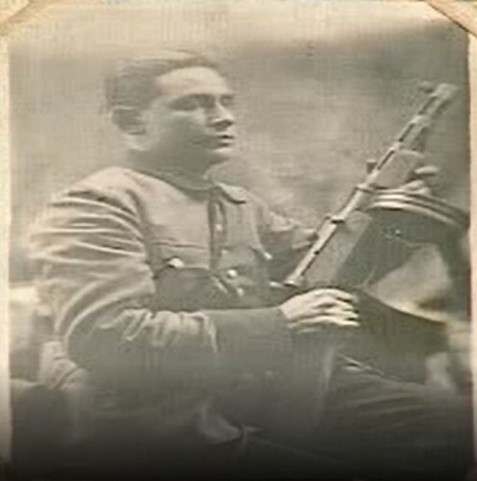Iosif Golba was born in 1919 in Yaroslavl, 250 kilometers northeast of Moscow. His father Leyzer (Eliezer) had moved to this purely Russian city from Belorussia, where he had been an innkeeper, during World War I. In Yaroslavl, he worked as a clerk at a leather factory; he died in the late 1920s. Iosif's mother Dvoyra, the daughter of a disabled World War I veteran, settled in Yaroslavl at about the same time; she was a homemaker. Iosif had one older brother. Following the death of Leyzer, the breadwinner, the family had to change their place of residence several times in the 1930s. In 1935, while living in the town of Tula, Iosif became apprenticed to a clock repairer. In 1938, Iosif enrolled in the Tula School of Armaments Technicians, which he finished in 1940 in the rank of lieutenant-technician. He was then attached to the 72nd Reserve Rifle Regiment, and later transferred to the 532nd Light Artillery Regiment.
On June 22, 1941, the Soviet-German War broke out, and in early July Iosif arrived on the frontline in eastern Belorussia, along with his workshop for fitting gunnery appliances. As a result of the heavy losses of artillery pieces in combat, the remnants of Golba's regiment were reformed into a group for artillery support of the infantry. On August 6, 1941, after a month of fighting and retreating eastward, the group was surrounded by the Germans. Several days later, despite repeated attempts to break out of the encirclement, Golba and his comrades were taken prisoner. In the first POW camp, the Germans arranged the inmates in a row and ordered all the Jews and "commissars" to take three steps forward. To Golba's surprise, several POWs of partial Jewish descent stepped forward as ordered; they were shot along with the "full" Jews.
"I did not step forward," Golba would later recall, "we were so dirty and unshaved that no one could recognize me as a Jew" .1
After a month-long stay in POW camps, Golba was lent to a local Belorussian peasant as a farmhand. Shortly thereafter, he left the farm and wandered through the villages of northern Belorussia, making his living as an itinerant repairer of clocks and other home appliances. In the spring of 1942, Golba joined a Soviet partisan unit as a weapons repairer. Among other things, he took part in the derailing of four enemy trains. As a member of the "Chkalov" partisan brigade, he fought – and supplied his comrades with serviceable arms and explosives – until early July 1944, when Belorussia was liberated by the Red Army. That same month, Golba took part in a partisan parade in Minsk, after which he (along with the other participants) was awarded the medal "Partisan of the Great Patriotic War", 1st class; shortly thereafter, he also received the Order of the Red Star. Over the following days, most of the former partisans were attached to the regular army, while Golba was sent to the Minsk aircraft construction plant as an administrative worker. Dissatisfied with this non-combat appointment (especially since the heavily damaged plant was not yet operational), Golba showed up at the Minsk recruitment office and requested to be sent to the frontline. Upon learning Golba's military specialty, the head of the recruitment office suggested that he sort through the abandoned German weapons and ammunition. A month later, having completed this task, Golba was sent to Tula to work in the armaments industry. Following a brief stay in Tula, Golba managed to get discharged from the army, and he returned to Yaroslavl.
In 1995, following his children, Iosif Golba immigrated to the USA.
- 1. YVA O.93/51345







